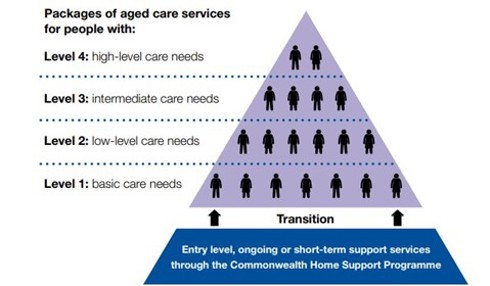The latest data on how long it takes to get a Home Care Package
21/03/2024

It is the policy of the Australian Government and the wish of most people to remain in their home for as long as possible.
To assist people who need care as they age, the government provides Home Care Packages, which it subsidises subject to a means-test. Before receiving in-home care, including a Home Care Package, a person needs to take an assessment to find out if they are eligible to receive a Home Care Package and the level of a package.
Tim Hicks, Bolton Clarke's Executive General Manager Policy and Advocacy, has looked at answers given to Opposition Minister for Aged Care, Anne Ruston, by the Department of Health and Aged Care and the latest data from the Productivity Commission.
He said it is "a bit over six months for most people and around 10+ months for the outliers" to get home care.
He said the median wait (the middle value in a set of data) to be assessed for a Home Care Package is 17 days, an improvement on FY23 when the the average was 36 days. 
"We don't have trends for assessment wait times. We can see trends in the rate of assessments per person 65+ and this is pretty stable. The average age of the 65+ cohort is increasing so the rate of assessments should really be going up to keep pace with demand,” said Tim.
"17 days seems reasonable as a median. But the issue here is really about the outliers. Some states have longer waits than others. But I suspect the variance would get even bigger if it could be broken down region by region."
The mean wait time after being assessed for a Home Care Package to be assigned a package is 132 days, with the 90th percentile 182 days in FY23.
"This is a much shorter wait than in previous years, which had median wait times to be assigned a package of up to 405 days in FY21. However, wait times are increasing again in FY24 as the release of new packages has slowed,” Tim said.
The median wait time to get services after being assigned a Home Care Package is 38 days, with the 90th percentile 76 days.
"Both the median and 90th percentile results have been pretty stable over time. Maybe up a little bit, but only by a few days. This runs counter to anecdotal feedback that it's getting hard to find a provider,” he adds.
Put the information together and the median wait time to receive a Home Care Package is slightly over six months. For some regions it appears wait times are at least 298 days or almost 10 months.
"That's clearly still too long and getting longer. Although the extra time to get assessed and commence services is less than many anecdotal reports have suggested," Tim said.
The Australian Government has said it will introduce the Support at Home program to replace Home Care Packages and the Short-Term Restorative Care Programme from 1 July 2025.














